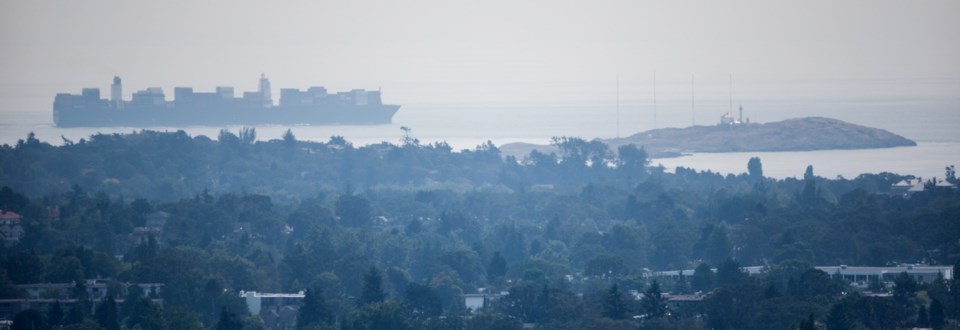The smoky air that has settled over Greater Victoria and other parts of Vancouver Island could be largely gone by the end of the week, as rainy weather moves in.
“Our weather forecaster is telling us that he’s feeling the smoke may start to move out on Friday,” said Donna MacPherson, a fire information officer for the Parksville-based Coastal Fire Centre. “That’s his best guess at this point.”
Relief from the haze, caused by wildfires in the Interior, will follow a change in wind patterns, she said. Outflow winds have been carrying smoke from the Interior to the B.C. coast, but that’s expected to dissipate soon, “and then what we’ll do is we’ll get back to our normal summer weather, which is winds from the ocean onshore.”
> For more information on air quality and B.C. wildfires, see our roundup
There are two wildfires on Vancouver Island, both in the Nanaimo area. They started Sunday and are now in mop-up stage, said Nicole Gagnon, a fire information officer for the Coastal Fire Centre. One of the fires was on Extension Road and reached a size of 0.35 hectare, while the other on Blackjack Forest Service Road reached one hectare.
While the Interior is suffering through the worst wildfire season in decades, MacPherson said the number of fires is down this year in the Coastal Fire Centre’s jurisdiction, which includes the Island and a portion of the southeast mainland.
Typically, by Aug. 8, the centre would expect to have had about 161 fires, 98 of them human-caused, MacPherson said. “Right now in total we’ve had 74 and we’ve had 70 person-caused fires — so we’re down almost 30 person-caused fires and we’re down a whole lot of lightning-caused fires.
“Normally we have 63 lightning fires [by now], and we’ve only had four.”
MacPherson said the public seems to be heeding warnings about being careful in the woods. The campfire ban enacted July 6 is continuing. “I think the steady message that we’ve been putting out is getting through to people. We just need them to keep it up.”
There could be some help from the weather on the weekend, with a chance of rain on Saturday and Sunday. If precipitation holds off until Sunday, this summer will tie the all-time record for dry weather in Greater Victoria at 53 days, said Environment Canada meteorologist Cindy Yu.
The mark, based on measurements at Victoria International Airport, was set in 1986 from July 18 to Sept. 8. The last rain at the airport this year was on June 20.
“We could see something as early as Saturday overnight,” Yu said of the chance of rain. “But Sunday and Monday, we should get a couple of millimetres.”



